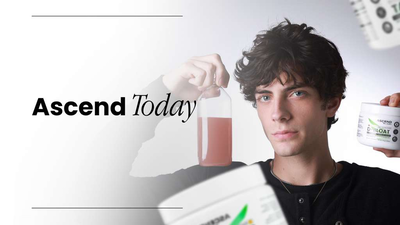Rabbi
Tel Aviv, Israel
- Joined
- Feb 28, 2020
- Posts
- 25,757
- Reputation
- 72,612
FYI this is lactose intolerance not a milk allergy two completely different things if you have the latter avoid milk and consult a doctor.
Causes of lactose intolerance
All causes of lactose intolerance stems from a deficiency of the lactase enzyme
Primary lactose intolerance:
e.g I might have enough lactase to drink one glass of milk with no problem but at two glasses I'll suffer indigestion.
The solution to this problem is NOT to reduce or eliminate dairy consumption, on the alternative you should look to increase consumption over a controlled period of time.
Note your body is dynamic and with the cessation of lactose consumption your body will stop producing lactase as need to be and you end up at a worse place than where you started.
The Answer


 www.ncbi.nlm.nih.gov
www.ncbi.nlm.nih.gov
A crossover randomized control trial
4500 fcc lactase enzyme supplement reduced hydrogen in breath by 55% compared to placebo in a double blinded cross over RCT which is pretty robust as far as human evidence goes. Hydrogen is a relevant biomarker since when lactose is not adequately digested hydrogen is released in the breath. This is the closest thing to a cure for lactose you can find.

Causes of lactose intolerance
All causes of lactose intolerance stems from a deficiency of the lactase enzyme
Primary lactose intolerance:
- Usually genetically set and determined
- After a period of time the genes that express the production and function of lactase enzyme turn off post weaning
- Usually occurs in early childhood or adolescence
- Usually onset by GI disturbances or antibiotic usage
- Transient solves itself with time a non issue for most parts
Lactase enzyme deficiency can occur in individuals with lower levels of this enzyme, resulting in failure to hydrolyze lactose into absorbable glucose and galactose components
TLDR the onset of lactose intolerance symptoms is regulated by the levels of lactase endogenously produced and the level of lactose consumed.Lactase deficiency may lead to lactose intolerance (LI). Depending both on the amount of lactose ingested and on the lactase activity, people who suffer from lactose malabsorption might experience numerous gastrointestinal and extra-intestinal symptoms and manifestations
e.g I might have enough lactase to drink one glass of milk with no problem but at two glasses I'll suffer indigestion.
The solution to this problem is NOT to reduce or eliminate dairy consumption, on the alternative you should look to increase consumption over a controlled period of time.
Note your body is dynamic and with the cessation of lactose consumption your body will stop producing lactase as need to be and you end up at a worse place than where you started.
In addition, individuals who can typically tolerate lactose might become temporarily lactose intolerant if they avoid lactose-containing products for a long time. The body can stop producing adequate quantities of lactase if it doesn’t need to. However, slowly increasing lactose intake can build back a suitable level of lactase production.
The Answer
- Consume foods that contain lactase in them, most yogurts and Kefir contain Lactobacillus bulgaricus, Lactobacillus acidophilus or Bifidobacterium as long the pasteurisation was done before the fermenting process not after. These strains contain lactase within them, they both lower the lactose in milk but also contain lactase


2. Supplement with lactase enzymes. Yes its a thing on the market and it is legithttps://pubmed.ncbi.nlm.nih.gov/24695892/ "The lactose in yogurt is digested more efficiently than other dairy sources of lactose because the bacteria inherent in yogurt assist with its digestion. The bacterial lactase survives the acidic conditions of the stomach, apparently being physically protected within the bacterial cells and facilitated by the buffering capacity of yogurt. The increasing pH as the yogurt enters the small intestine and a slower gastrointestinal transit time allow the bacterial lactase to be active, digesting lactose from yogurt sufficiently to prevent symptoms in lactose-intolerant people
Effect of lactase on symptoms and hydrogen breath levels in lactose intolerance: A crossover placebo‐controlled study - PMC
The absence of lactase in the intestinal villi due to mucosal injury or genetic factors causes undigested lactose to reach the colon where it is fermented. Lactose intolerance is diagnosed based on clinical symptoms like bloating, abdominal pain and ...
A crossover randomized control trial
In simple formMethods
This was a randomized, double‐blind, crossover placebo‐controlled trial to study the effect of lactase tablets on symptoms and hydrogen breath levels in adults with lactose intolerance, confirmed by Lactose HBT. Clinical symptom severity was recorded using a visual analog scale, and HBT was performed every 30 min for 180 min. As it was a crossover design, the same patients were tested with both lactase and placebo, acting as their own controls with a washout period of 1 week between visits.
Results
Forty‐seven patients (mean age 33.6 years; 30 males) with lactose intolerance formed the study group. Clinical symptoms, mean clinical score (P < 0.05), and mean hydrogen breath levels (P < 0.05) were improved when the patients were given lactase. Reduction in cumulative hydrogen breath level over 180 min was 55% when patients received lactase compared to placebo.
Conclusions
Orally supplemented lactase enzyme significantly reduced the clinical symptoms and hydrogen breath excretion in patients with lactose intolerance.
4500 fcc lactase enzyme supplement reduced hydrogen in breath by 55% compared to placebo in a double blinded cross over RCT which is pretty robust as far as human evidence goes. Hydrogen is a relevant biomarker since when lactose is not adequately digested hydrogen is released in the breath. This is the closest thing to a cure for lactose you can find.




